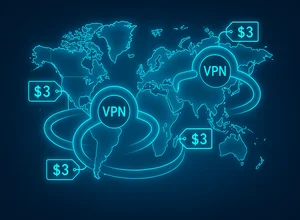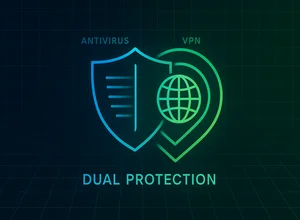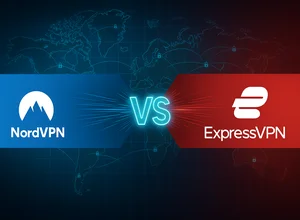What You Must Know Before Buying a VPN
Navigating the world of Virtual Private Networks can be complex. This guide breaks down the essential features you need to understand, helping you choose the perfect VPN to protect your online privacy and security.
To make a smart decision when buying a VPN, you need to understand the core features that ensure your privacy and security. A VPN, or Virtual Private Network, creates an encrypted "tunnel" for your internet traffic, hiding your IP address and protecting your data from prying eyes like your Internet Service Provider (ISP), hackers, and advertisers.
No-Logs Policy: The Foundation of Privacy
A no-logs policy is a VPN provider's promise not to collect, track, or store any information about your online activities. This includes:
Usage Logs: Your browsing history, files you download, or apps you use.
Connection Logs: Your original IP address, connection timestamps, session duration, and the amount of data transferred.
Why it matters: Even with an encrypted connection, your VPN provider can still see what you're doing online. If they keep logs, that data could be requested by government agencies or stolen in a data breach, compromising your privacy. A true no-logs VPN ensures that even if compelled to hand over user data, they have nothing to provide.
How to verify: Look for a VPN that has had its no-logs policy verified by an independent, third-party audit. This audit confirms the company's claims and shows a commitment to user privacy.
Strong Encryption: The Digital Lock
Encryption is the process of scrambling your data into an unreadable format, called ciphertext. Only someone with the correct decryption key can unscramble it. The industry standard is AES-256 (Advanced Encryption Standard with a 256-bit key).
How it works: Think of encryption as a complex mathematical lock. Your device uses a public key to lock the data before it enters the VPN tunnel. The VPN server has a private key to unlock it and send it on to its destination. Even if someone intercepts your data, it's just a jumble of characters without the key. AES-256 is so secure that it would take millions of years for the most powerful supercomputers to crack it using a brute-force attack.
Kill Switch: Your Safety Net
A kill switch is a crucial security feature that automatically cuts your internet connection if your VPN connection unexpectedly drops.
Why it's essential: VPN connections can sometimes fail due to server issues, a weak Wi-Fi signal, or network changes. Without a kill switch, your device would automatically revert to its regular, unsecured internet connection. This could instantly expose your real IP address and online activity to your ISP and any other onlookers. The kill switch acts as a failsafe, preventing any data leaks until the secure VPN connection is re-established.
DNS Leak Protection: Preventing the Hidden Exposure
DNS (Domain Name System) is like the internet's phonebook. When you type a website name like "google.com" into your browser, a DNS query is sent to a DNS server to find the corresponding IP address.
What is a DNS leak?: Normally, when you use a VPN, these DNS requests are sent through the encrypted tunnel to the VPN's private DNS servers. A DNS leak occurs when your device bypasses the VPN tunnel and sends these requests to your ISP's DNS servers instead. This reveals your browsing history to your ISP, completely defeating the purpose of the VPN.
How it works: A good VPN with DNS leak protection forces all DNS traffic through its own encrypted servers, ensuring your queries remain private and your online activity is completely hidden from your ISP.
Multiple Protocols: The Choice of Speed and Security
VPN protocols are the set of rules that determine how data is routed and encrypted within the VPN tunnel. Having a choice of protocols allows you to balance speed and security for different online tasks. The two most common and reliable protocols are OpenVPN and WireGuard.
| Feature | OpenVPN | WireGuard |
|---|---|---|
| Speed | Slower | Faster |
| Security | Highly configurable, considered a gold standard | Modern and cryptographically sound |
| Codebase | Large (hundreds of thousands of lines of code) | Small (around 4,000 lines of code) |
Other Essential Features to Consider
In addition to the core features discussed earlier, there are a few other essential features to consider when choosing a VPN:
- Server Network: A large network with servers in many countries gives you more options for bypassing geo-restrictions and finding a fast, reliable connection.
- Simultaneous Connections: This indicates how many devices you can connect to the VPN at the same time on a single account.
- Split Tunneling: This advanced feature lets you choose which apps or websites use the VPN tunnel and which ones connect directly to the internet. It's useful for streaming local content or accessing banking apps that might block VPN connections.
- Jurisdiction: The country where the VPN provider is based matters. Look for a provider in a privacy-friendly country with no mandatory data retention laws.
VPN Comparison Table
| Feature | NordVPN | Surfshark | ProtonVPN | Bitdefender VPN |
|---|---|---|---|---|
| No-Logs Policy | Independently Audited: Yes (PwC & Deloitte) | Independently Audited: Yes (Deloitte) | Independently Audited: Yes (Securitum) | Independently Audited: Yes (in 2025) |
| Encryption | AES-256 | AES-256 | AES-256 | AES-256 |
| Kill Switch | Yes: System-level & app-level | Yes: System-level | Yes: System-level & "permanent" | Yes |
| DNS Leak Protection | Yes: Built-in | Yes: Built-in | Yes: Built-in | Yes: Built-in |
| Protocols | NordLynx, OpenVPN, IKEv2/IPsec | WireGuard, OpenVPN, IKEv2 | WireGuard, OpenVPN, IKEv2 | Catapult Hydra, IPsec, OpenVPN |
| Simultaneous Connections | Up to 10 devices | Unlimited devices | Up to 10 devices | Up to 10 devices |
| Server Network | 6,300+ servers in 116+ countries | 3,200+ servers in 100+ countries | 3,000+ servers in 70+ countries | 4,000+ servers in 50+ countries |
| Jurisdiction | Panama | Netherlands | Switzerland | Romania |
| Unique Features | Threat Protection, Double VPN, Meshnet | CleanWeb, MultiHop, Nexus | Secure Core, VPN Accelerator | Ad Blocker, Split Tunneling |
| Get it Now | Get NordVPN | Get Surfshark | Get ProtonVPN | Get Bitdefender |
Final Thoughts
By understanding these essential features, you're now equipped to move past the marketing jargon and make an informed decision. A VPN isn't just a simple tool; it's a critical component of your digital security and privacy toolkit. Choosing the right one means protecting your data, your identity, and your freedom to explore the internet without limits.
The market is full of options, but by prioritizing a verified no-logs policy, strong encryption, a reliable kill switch, and robust leak protection, you can narrow your choice to providers that are genuinely committed to your privacy. The comparison table above highlights how some of the most popular providers stack up against these crucial criteria, giving you a head start in your search.
Remember, your choice of VPN is a personal one that should align with your specific needs. Do you need unlimited connections for a large family? Surfshark might be a great fit. Are you a journalist or activist who needs the highest level of security and a proven track record? ProtonVPN's Swiss jurisdiction and Secure Core feature make it a strong contender. The key is to start with the fundamental features that guarantee your safety, then look at the added benefits that make your online experience seamless and secure.
By prioritizing security and doing your research, you can confidently navigate the VPN market and find a service that truly protects you.

Best Budget VPN Under $3 Per Month: Top Affordable Options
Discover the best affordable VPN services under $3 monthly. Compare Surfshark, ProtonVPN, and other budget-friendly options for security and streaming in 2025.

Why Surfshark Leads the Antivirus + VPN Race in 2025
Discover why the Surfshark One bundle is 2025’s ultimate all-in-one cybersecurity package, combining premium antivirus, VPN, and privacy tools in one plan.

NordVPN vs ExpressVPN: Why NordVPN Wins in 2025
Compare NordVPN vs ExpressVPN in 2025. Explore differences in speed, pricing, security, and streaming to see why NordVPN is the smarter choice this year.
